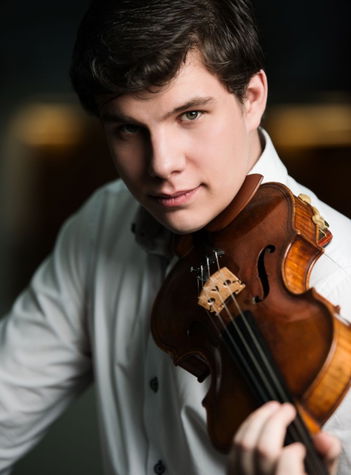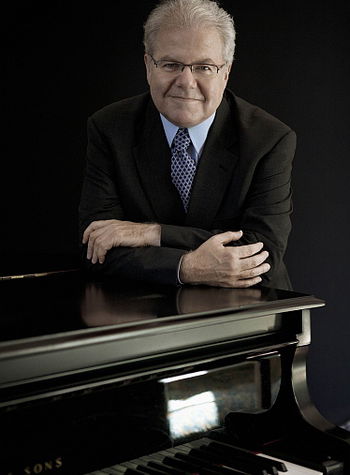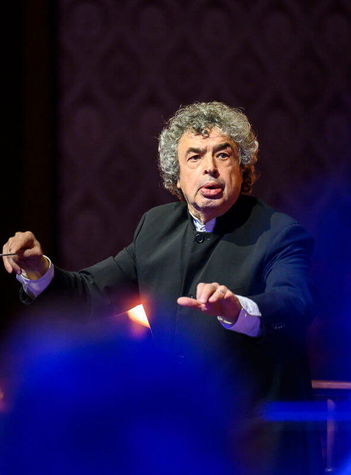Programme
Antonín Dvořák
Violin Concerto in A minor, Op. 53
Johannes Brahms
Piano Concerto No. 1 in D minor, Op. 15
Secure your seat for the 2025/2026 season – presales are open.
Choose SubscriptionThis time, chief conductor Semyon Bychkov has decided for an unsurprising but purely dramatic programming arch. We will hear concertos by Antonín Dvořák and Johannes Brahms, artistic colleagues and friends for many years. Czech Philharmonic concertmaster Jan Mráček will play Dvořák’s Violin Concerto, and at the piano in Brahms will be seven-time Grammy Award winner Emanuel Ax.
Subscription series C
Antonín Dvořák
Violin Concerto in A minor, Op. 53
Johannes Brahms
Piano Concerto No. 1 in D minor, Op. 15
Jan Mráček violin
Emanuel Ax piano
Semyon Bychkov conductor
Czech Philharmonic

In 1877, when Dvořák’s application for financial support and the score of his Moravian Duets were received by the committee in Vienna in charge of granting stipends, the jury member Johannes Brahms arrived at the opinion that Dvořák deserved more support. “He is definitely a very talented artist. And poor, incidentally. Please consider that!” Brahms wrote in a letter to his publisher Simrock. That was the beginning of Dvořák’s international success, and also of a 20-year friendship between the two composers.
It was also thanks to Brahms that Dvořák met the violinist and teacher Joseph Joachim. The first violinist of the Joachim Quartet, he premiered some of Dvořák’s chamber works, helping to spread awareness of his music. When Simrock commissioned a violin concerto from Dvořák in 1879, the composer reached an agreement with the famous virtuoso in Berlin that he would give the premiere.
Work on the composition proceeded slowly because Joachim returned the concerto to the composer several times with comments encouraging Dvořák to revise the work repeatedly. In the end, at the premiere in October 1883, instead of Joachim, the soloist was František Ondříček, to whom Brahms later also entrusted his Violin Concerto.
Joachim already had a major impact on the life of Johannes Brahms in his youth. He introduced the 20-year-old composer to Robert Schumann and his wife Clara, who later became one of the first interpreters of Brahm’s Piano Concerto No. 1 in D minor.
The American pianist Emanuel Ax was already developing an intense relationship with Brahms at the conservatoire Brahms: “I already fell in love with his music as a teenager. From my parents, I had a recording of Rubinstein’s interpretation, and I wore out the grooves of two copies by playing them over and over.”
Besides having recorded both Brahms concertos, Ax has recordings of many of his chamber works to his credit. For recording the Brahms sonatas for cello and piano with the cellist Yo-Yo Ma, he received three of his seven Grammy Awards.
Jan Mráček violin

The Czech violinist Jan Mráček was born in 1991 in Pilsen and began studying violin at the age of five with Magdaléna Micková. From 2003 he studied with Jiří Fišer, graduating with honors from the Prague Conservatory in 2013, and until recently at the University of Music and the Performing Arts in Vienna under the guidance of the Vienna Symphony concertmaster Jan Pospíchal.
As a teenager he enjoyed his first major successes, winning numerous competitions, participating in the master classes of Maestro Václav Hudeček – the beginning of a long and fruitful association. He won the Czech National Conservatory Competition in 2008, the Hradec International Competition with the Dvořák concerto and the Janáček Philharmonic Orchestra in 2009, was the youngest Laureate of the Prague Spring International Festival competition in 2010, and in 2011 he became the youngest soloist in the history of the Czech Radio Symphony Orchestra. In 2014 he was awarded first prize at Fritz Kreisler International Violin Competition at the Vienna Konzerthaus. When the victory of Jan Mráček was confirmed, there was thunderous applause from the audience and the jury. The jury president announced, “Jan is a worthy winner. He has fascinated us from the first round. Not only with his technical skills, but also with his charisma on stage.”
Jan Mráček has performed as a soloist with world’s orchestras, including the Royal Philharmonic Orchestra, St. Louis Symphony, Symphony of Florida, Tchaikovsky Symphony Orchestra, Kuopio Symphony Orchestra, Romanian Radio Symphony, Lappeenranta City Orchestra (Finland) as well as the Czech National Symphony Orchestra, Prague Symphony Orchestra (FOK), Janáček Philharmonic Orchestra and almost all Czech regional orchestras.
Jan Mráček had the honor of being invited by Maestro Jiří Bělohlávek to guest lead the Czech Philharmonic Orchestra in their three concert residency at Vienna’s Musikverein, and the European Youth Orchestra under Gianandrea Noseda and Xian Zhang on their 2015 summer tour. He has been a concertmaster of the Czech Philharmonic since 2018.
In 2008 he joined the Lobkowicz Piano Trio, which was awarded first prize and the audience prize at the International Johannes Brahms Competition in Pörtschach, Austria in 2014.
His recording of the Dvořák violin concerto and other works by this Czech composer under James Judd with the Czech National Symphony Orchestra was recently released on the Onyx label and has received excellent reviews.
Jan Mráček plays on a Carlo Fernando Landolfi violin, Milan 1758, generously loaned to him by Mr Peter Biddulph.
Emanuel Ax piano

“Within minutes, we are totally captured by his intensity and pianistic achievement,” wrote the Los Angeles Times about the 74-year-old pianist Emanuel Ax. “Manny”, as he is sometimes called, is regarded as one of today’s most sincere and modest artists despite having been in the limelight of the worldwide music scene since 1974, when he won the inaugural Arthur Rubinstein International Piano Competition in Tel Aviv. He even has a fan club, “Manny Ax Maniacs”, the members of which wear t-shirts bearing the club’s name to his concerts.
Emanuel Ax was born in Poland, but as a young child he moved with his parents first to Canada, then to New York. There, he studied at the Juilliard School, where he now teaches, and he gave his concert debut as part of the Young Concert Artists Series. Victory at the Rubenstein Competition along with the Michaels Award of Young Concert Artists and the Avery Fischer Prize catapulted him onto the concert stage, where he achieved success of the highest order as a soloist and in chamber music.
Also of importance to his career was his partnership with the Sony Classical label, for which he has been recording exclusively since 1987. He even won a Grammy for his second and third albums in a series of Haydn piano sonatas. He also won this most prestigious of recording prizes for albums of the Beethoven and Brahms sonatas for cello and piano, which he recorded with Yo-Yo Ma, his long-time artistic partner. Ax, Yo-Yo Ma, and Leonidas Kavakos also recently launched an ambitious project to play all of Beethoven’s piano trios as well as his symphonies arranged for those forces. They are now promoting the project, known as “Beethoven for Three”, with live concert performances. So far, they have recorded symphonies nos. 2, 5, and 6 along with the Op. 1 piano trios.
Besides the traditional repertoire (or arrangements of it), he also devotes himself very intensively to premiering new works by contemporary composers. For example, he has been the first to play new works by such composers as Krzysztof Penderecki and John Adams; in October 2023 he gave the premiere of Anders Hillborg’s Piano Concerto No. 2, “The MAX Concerto”, written by that contemporary Swedish composer on commission for the San Francisco Symphony led by Esa-Pekka Salonen. In addition, this season has featured a European tour (mainly with the Concertgebouw Orchestra and the Bavarian State Orchestra) and a series of Beethoven-Schoenberg recitals around the USA, where Ax lives (in New York) with his wife, the pianist Yoko Nozaki.
Semyon Bychkov conductor

In addition to conducting at Prague’s Rudolfinum, Semyon Bychkov and the Czech Philharmonic in the 2023/2024 season, took the all Dvořák programmes to Korea and across Japan with three concerts at Tokyo’s famed Suntory Hall. In spring, an extensive European tour took the programmes to Spain, Austria, Germany, Belgium, and France and, at the end of year 2024, the Year of Czech Music culminated with three concerts at Carnegie Hall in New York.
Among the significant joint achievements of Semyon Bychkov and the Czech Philharmonic is the release of a 7-CD box set devoted to Tchaikovsky’s symphonic repertoire and a series of international residencies. In 2024, Semjon Byčkov with the Czech Philharmonic concentrated on recording Czech music – a CD was released with Bedřich Smetanaʼs My Homeland and Antonín Dvořákʼs last three symphonies and ouvertures.
Bychkovʼs repertoire spans four centuries. His highly anticipated performances are a unique combination of innate musicality and rigorous Russian pedagogy. In addition to guest engagements with the world’s major orchestras and opera houses, Bychkov holds honorary titles with the BBC Symphony Orchestra – with whom he appears annually at the BBC Proms – and the Royal Academy of Music, who awarded him an Honorary Doctorate in July 2022. Bychkov was named “Conductor of the Year” by the International Opera Awards in 2015 and, by Musical America in 2022.
Bychkov began recording in 1986 and released discs with the Berlin Philharmonic, Bavarian Radio, Royal Concertgebouw, Philharmonia Orchestra and London Philharmonic for Philips. Subsequently a series of benchmark recordings with WDR Symphony Orchestra Cologne featured Brahms, Mahler, Rachmaninov, Shostakovich, Strauss, Verdi, Glanert and Höller. Bychkov’s 1993 recording of Tchaikovsky’s Eugene Onegin with the Orchestre de Paris continues to win awards, most recently the Gramophone Collection 2021; Wagner’s Lohengrin was BBC Music Magazine’s Record of the Year (2010); and Schmidt’s Symphony No. 2 with the Vienna Philharmonic was BBC Music Magazine’s Record of the Month (2018).
Semyon Bychkov has one foot firmly in the culture of the East and the other in the West. Born in St Petersburg in 1952, he studied at the Leningrad Conservatory with the legendary Ilya Musin. Denied his prize of conducting the Leningrad Philharmonic, Bychkov emigrated to the United States in 1975 and, has lived in Europe since the mid-1980’s. In 1989, the same year he was named Music Director of the Orchestre de Paris, Bychkov returned to the former Soviet Union as the St Petersburg Philharmonic’s Principal Guest Conductor. He was appointed Chief Conductor of the WDR Symphony Orchestra (1997) and Chief Conductor of Dresden Semperoper (1998).
Antonín Dvořák
Violin Concerto in A minor, Op. 53
The years 1878–1880 tend to be called Antonín Dvořák’s “Slavonic period” because it was especially at that time that he took Slavic folk music as his point of departure. It was also during those three years that he created such highly successful compositions as his Serenade for Winds, three Slavonic Rhapsodies, the Czech Suite, the Symphony No. 6, the first set of Slavonic Dances, Gypsy Melodies, and a number of piano compositions. In those days, a Slavonic “tone” was in demand in Czech-speaking territory for reasons of patriotism and in a European context to satisfy the desire for uniqueness and “exoticism”. One of Dvořák’s masterpieces, not limited to the context of his Slavonic period, is undoubtedly his Violin Concerto in A minor, Op. 53, written in Sychrov in the summer of 1879.
Naturally, the composer was pleased by the interest of Simrock’s Berlin publishing house in another work in a “Slavonic vein”. At the time, Dvořák was maturing as a composer, and he aspired to attempt virtuosity with inventive content. Like many of his contemporaries and predecessors beginning with Beethoven, Dvořák had a particular violin virtuoso in mind for the solo part, in his case Joseph Joachim, to whom he dedicated the concerto. In the spring of 1880, Dvořák even visited Joachim in Berlin and consulted on the work with him. The virtuoso violinist had reservations about certain passages that he regarded as being too difficult, and in his judgment the orchestration was too thick in places. That does not mean, however, that he did not express praise for the concerto. Dvořák made changes to the work at the suggestion of the violin virtuoso. He finished the last revisions in October 1882.
Afterwards, it became clear that Joseph Joachim would not give the concerto’s premiere, so Dvořák entrusted the first performance to the 26-year-old violin virtuoso František Ondříček. The premiere took place on 14 October 1883 at Žofín Palace accompanied by the Orchestra of the National Theatre under the baton of Mořic Anger. The performance was an extraordinary success. On his later tours, Ondříček helped bring Dvořák’s Violin Concerto to stages around the world, where it is still heard today.
Johannes Brahms
Piano Concerto No. 1 in D minor, Op. 15
This time, chief conductor Semyon Bychkov has decided for an unsurprising but purely dramatic programming arch. We will hear concertos by Antonín Dvořák and Johannes Brahms, artistic colleagues and friends for many years. Czech Philharmonic concertmaster Jan Mráček will play Dvořák’s Violin Concerto, and at the piano in Brahms will be seven-time Grammy Award winner Emanuel Ax.